The Great Betrayal Read online
In the elder ages when the world was young, elves and dwarfs lived in peace and prosperity. Dwarfs are great craftsmen, lords of the under deeps, artificers beyond compare. Elves are peerless mages, masters of the dragons, creatures of the sky and air. During the time of High King Snorri Whitebeard and Prince Malekith, these two great races were at the pinnacle of their strength. But such power and dominion could not last.Fell forces now gather against elves and dwarfs. Malekith, embittered by his maiming in the Flame of Asuryan, seeks to destroy them both but still darker powers are also at work. Already strained, disharmony sours relations between them until only enmity remains. Treachery is inevitable, a terrible act that can only result in one outcome... War.
The dwarf High King Gotrek Starbreaker marshals his throngs of warriors from all the holds of the Karaz Ankor, whilst the elves, under the vainglorious and arrogant Caledor II, gather their glittering hosts and fill the skies with dragons.
Mastery of the Old World is at stake, a grudge in the making that will last for millennia. Neither side will give up until the other is destroyed utterly. For in the War of Vengeance, victory will be measured only in blood.
Sins Of The Ancestors
I
Thunder rolled across the slopes of Karag Vlak, shaking the earth for miles. Fire wreathed the sky, warring with the furnace at the mountain peak that glowed hot and angry through swathes of pyroclastic cloud. Shadows lurked within that grey smog, drifting against the wind on membranous wings…
Eclipsed by the mountain, two great hosts had gathered on a blasted plain of scorched rock studded with the corpses of petrified trees. Death had changed this place. Pastureland had become a sprawling battlefield of skulls, flattened by war engines and thousands of booted feet. Air tasted like ash and the rivers were veins of smoking acid. Mordant horns and harrowing death cries supplanted the shrill of birds, the bray of elk.
In the middle of this carnage, a soaring monument of stone reached into the fiery sky. It was called the Fist of Gron, so named for its ugly, knuckled shape and reputedly after the dwarf king who had supposedly shaped it with his bare hands. Once it might have been a magnificent mountain pinnacle but some past cataclysm during the shaping of the world had reduced it to a flattened edifice. Other than the lesions of dead forest puckering the landscape, it was the only feature for miles.
And like the swell circling the eye of a maelstrom, a great battle raged around it. Thurgin Ironheart eyed the enemy charging at his throng across the hellish plain and scowled.
The dwarf was part of the second vanguard, summoned from his place at the foot of Karag Vlak where the rest of the host was encamped. He and his warriors were to fill the gap left by the throng of Karak Drazh. Thurgin had already lost sight of their shields, the sigils of the Black Hold trodden underfoot in the eagerness of the enemy to shed more blood.
‘They are swift,’ he said, drawing a nod from his nearby kinsmen. Thurgin felt the tremor of hoofbeats through his heavy black boots and iron-wrought armour. Runes of warding fashioned into the breastplate began to ignite in a chain of forge-bright flares that emblazoned the metal as the enemy neared. The fierce effigy of his dragon-faced war helm caught the flicker of fire. His short emerald cloak stirred in a foul wind rolling off the mountain. Muttering an oath to Grungni, he gripped the haft of his rune axe.
They would need an ancestor’s blessing this day.
Never before had dwarfs waged war against such a foe. All of the orcs and goblins festering beneath the world could not come close in number to the horde riding down upon them now. The cavalry were but a small part of it.
Two hundred feet away from bloodying his axe and Thurgin growled an order. Despite distance and the clamour of the battle, his words carried to every warrior in the throng.
‘Sons of Grungni, lock your shields!’
It was a resounding shout, made louder by the rune magic of his war helm, and a call to arms from which there could be no turning back.
Dwarfs do not turn back. In Khazalid, the language of the dawi, there is no word for retreat.
Across the slopes of Karag Vlak, ten thousand dwarfs of Karak Izril obeyed.
They were but the first rank.
Drums beat, horns blared. Eight more armies marched slowly into the fray. Here was where the fighting grew fiercest. Several massive regiments of infantry had already engaged farther down a long, rippling line. Thurgin’s throng were coming forwards like the end of a gate with their hinge a half-mile to their left, about to close on the cavalry charging at them.
Amidst the clash of arms, Thurgin saw the banners of Kadrin, Vlag and Eight Peaks amongst those of his own hold. Thousands of dwarfs fought hammer and axe against the enemy hordes. His heart swelled with pride at the sight, even though he knew it might be his last. Other holds joined in as the dwarfs came together as one, but it was to the standard of the High King that Thurgin’s eye was finally drawn.
Almost a mile away, standing upon the Fist of Gron, Thurgin saw him.
It was said the High King could break the stars. To witness the rune blade he wielded in a two-handed grip, splitting heads as if they were rotten barrels, Thurgin could believe it.
There was no time left to worry about the fate of the High King. Thurgin’s march had brought his warriors into the fray. The horns lessened and the drums stopped beating as the dwarfs of Karak Izril waited silently for what they knew would happen next.
Less than a hundred feet away, the enemy came fast and hard on hooves of silver flame.
Thurgin felt the solidity of his clan brothers at either shoulder and smiled.
This would be a good day for the dwarfs.
Vengeance would be theirs.
He shouted, voice louder than a hundred war horns, ‘Khazuk!’
The throng of Karak Izril answered, its many ranks adding to the fury of their reply: ‘Khazuk!’
Axes and hammers began to beat shields, rising in tempo as the riders closed.
‘Khazuk!’
Thurgin slid the ornate faceplate over his eyes and nose until it clanked into place, and the world became a slit of honed anger.
His brothers’ chorus resonated through his helm, chiming with the clash of arms.
‘KHAZUK!’
It meant war.
War had come to the enemies of the dwarfs.
Glarondril the Silvern spurred his riders to greater effort. Standing up in his stirrups, he let the fire of the angry mountain reflect in his gleaming armour. Without a helmet, his long white hair cascaded down the back of his neck like a mane of frost. His eyes were diamond-hard, his jaw set like marble.
The enemy was close; a thick wedge of mailed warriors that seemed to stretch the length of the horizon, clutching blades and shields.
Twenty thousand noble lords at his command, armour glittering with the falling sun, lowered their lances.
They had raced hard and far to reach this hellish plain. Glarondril would not be found wanting on the slopes of the mountain. He would see the battle through to its end, even if that meant his death. Whispering words of command to his mount, he drew the riders into a spear tip of glittering silver.
‘In the name of the Phoenix King,’ he roared, unable to keep his battle-lust sheathed any longer. A sword of blue flame slid soundlessly from his scabbard. ‘For the glory of Ulthuan!’
The enemy were so close… Glarondril saw their hooded eyes, shimmering like moist gemstones, and smelled the reek of their foul breath, all metal and earth.
‘None shall live!’
The blue-fire sword was held aloft as a thicket of lance heads drew down before the charge.
Thurgin felt his body tense just before the moment of impact.
‘Hold them, break them!’ he roared, ‘No mercy! Kill them all!’
Here before them was a foe worthy of dwarf enmity.
The shield wall dug in, backs and shoulders braced. All fifty thousand in this single throng came together. The muster from Karak Izril was large, but far from the largest of the holds. Deeper into the plain, Thurgin knew there were others similarly embattled. He prayed to Valaya for their souls as well his own and that of his men.
Behind the thick infantry formations, he heard the slow tread of the gronti-duraz. Through the dense earth he could feel the tremor of their footfalls as the low, sombre chanting of their masters animated them. Thurgin was glad to have the stone-clad behemoths at his back.
Above, lightning cracked the sky as magical anvils were made ready.
On the far mountain flank to Thurgin’s left, the bolt tips of ballistae twinkled in the dying light through a rolling fog. They looked like stars.
Dwarfs did not need the stars, or the sun. They were dwellers of the earth, solid and determined. They would need those traits today, as they would need all the craft of the runesmiths and the engines of the guilds to overcome the horde upon the plain.
They were foul and wretched creatures that the dwarfs would drive from the Old World forever.
At last the enemy reached them, a collision of barbed lances and mewling steeds against dwarf shields and tenacity.
As he raised his axe to strike, Thurgin knew no quarter would be given.
He would ask for none.
Glarondril and his knights swept into the armoured horde, piercing flesh and shattering bone. Severed heads fell from the necks of his foes as he swept around his blazing blue sword in a killing arc. A jab disembowelled another, as hundreds of lances struck flesh, impaling dozens with every vengeful thrust.
‘I am the Master of Dragons,’ he roared. ‘Behold your doom!’
Incandescent fire spewed from the jaws of the elven mounts. It rose in a tide that burned their enemies to ash. No defence was proof against the Dragon Princes of Caledor. No foe, however determined, could resist their charge. The few who did survive found their attacks repelled harmlessly by dragonscale harder than plate. The beasts snarled in contempt, crimsons, ambers, emeralds and azures, a myriad of colour and fury, tearing at limbs with fang and claw.
Hundreds of the enemy died in the first seconds, spitted by lances, devoured by the dragons or burned alive, their corpses left to ruin in the sun. What began as a contest swiftly became a slaughter.
A leader, his armour thicker than the rest, bellowed a challenge at Glarondril who accepted without hesitation.
‘For the king!’ he shouted above the eager roar of his mount, as he took the enemy leader’s head.
‘For the king!’ urged Thurgin, chopping into the riders blunted on the dwarfs’ wall of shields. A spurt of ichor splashed across the dark lacquer of his vambraces but he ignored it, thumping with his shield and hacking with his axe. The runes on the blade flared like star-fires as it hewed through iron-hard skin like it was parchment.
Though the foe pushed and pressed, using every ounce of their depraved strength, the dwarfs held back the tide. Utterly implacable, the shield wall didn’t budge and the enemy cavalry buckled as they rolled against it. Riders in the rear ranks, unable to arrest their momentum, barrelled into those in front. The enemy’s formation rippled, mounts and riders sent sprawling only to be crushed by those that followed in their wake, or butchered by dwarf axes.
Thurgin knew they had weathered the worst of it, and now what they had to do next.
‘Forward!’
Fifty thousand booted feet stomped in unerring unison. The enemy resisted at first, but once the dwarfs had overcome the inertia caused by the broken bodies underfoot they were unstoppable. The throng of Karak Izril moved slowly but inexorably. Like a landslide, and with the same momentum, they cascaded over the cavalry and destroyed it. Already smashed against the dwarfs’ resilience, the riders scattered. Harried without mercy by the triumphant dwarfs, the enemy cavalry had lost two-thirds of its warriors before the charge was ended. Thurgin himself had accounted for no fewer than fifteen of the creatures.
Seeing no gain in pursuit, he called the throng to a halt. His chest was heaving and there was a burning sensation in his shoulder from the violent axe-work, but it was a good pain.
Taking a moment to look around, he realised the battle was perched on a dagger’s edge. A heavy toll had been taken of the enemy, but they were numerous and their will bordered on fanatical.
Lifting up the faceplate of his dragon helm, Thurgin’s eye was drawn upwards to a vast shadow approaching him and his warriors from out of the sun. Not one of the throng of Karak Izril so much as flinched.
‘We have the east flank,’ he called out. An elven dragon rider, leading his scaled host, answered with a clenched fist and a broad, warlike smile.
Glarondril landed gracefully and bowed in the saddle to the thane-lord of Karak Izril. So too did his beast.
‘Well met, Thurgin son of Brak.’ He wiped the ichor from his sword before sheathing it. Behind him, almost twenty thousand dragons lowered their heads in respect to their allies. Each of their riders, every one of them a prince, nodded.
The dwarfs slammed their fists against their breastplates, raising a mighty clamour.
‘High prince,’ answered Thurgin, thumping his own chestplate and the angular rune engraved upon it. ‘I am always glad to see the Master of Drakk and his host.’ He gestured to the mound of sundered daemon corpses strewn around them. They were ugly creatures with hell-red skin, hooves and coiling horns that jutted from canine skulls. Foul steam rose off their broken bodies as the slow dissolution of their natures rendered them down to nothing but essence.
‘I am especially glad,’ Thurgin went on, ‘when his intervention crushes my enemies so gloriously and hands us a piece of the field to hold on to.’ He gestured to the slain host littering the ground for a hundred feet or more in front of them.
Glarondril regarded the daemon corpses with disdain.
‘We had best make the most of our good fortune then,’ remarked the elf, already spurring his mount.
‘Indeed…’ Thurgin turned his eye northwards where the bulk of the daemons festered and gibbered. ‘Those two fiends won’t kill themselves, now, will they?’
Even in the distance the leaders of the horde were easy to discern as they towered above their vassals: the feathered sorcerer and the bloated lord. Each was a prince of daemons with the innumerable hosts of Chaos at their command.
As the daemons retreated on one corner of the battlefield, they swelled in another. Thurgin saw them, the bulk of the cavalry he had butchered, the remnants left by Glarondril and his dragons, gathering around the Fist of Gron. And on that flat spur of rock was High King Snorri Whitebeard and the Elf Prince Malekith, alone and besieged by hell.
II
A sea of red-skinned death surrounded the king of the dwarfs and the prince of the elves. Though the Fist of Gron was over a hundred feet across, they could see the creatures capering and undulating below them because the horde stretched so far back onto the plain. Had they both stood in the middle of the flat, featureless rock that capped the Fist, Snorri and Malekith would still have seen them.
As it was they stood at either end, close to the edge, as determined warriors would defend a wall during a siege. But it was the braying, the animalistic moans and lascivious promises emanating from beneath them, that told the nobles their enemies were climbing up to fight them.
‘They are eager,’ shouted the High King, clashing his hammer and axe together in a challenge.
‘Try not to be as keen, old friend,’ the elf prince replied. ‘They are coming.’
Snorri and Malekith faced away from each other, but each knew that their coun
terpart was smiling.
This was the war to end all wars, the final battle against the daemons and the power of Ruin. Here, history was being made. Malekith and Snorri were its architects. But although legendary, this was not the first time that Chaos had challenged for mastery of the Old World.
Long ago the hosts of Chaos had come from the north. An icebound, unforgiving land, the north was thronged with feral tribes and great primordial beasts. These creatures were the first amongst the servants of Ruin, the denizens of the glacier caves and frost-bitten valleys quick to bend their knees in worship. Succour was granted without mercy, their bodies reshaped into horrific forms, just as their souls were cast to damnation. Through a great gate, from a hellish netherworld where all the laws and fabric of nature were mutable and perverted, Chaos spilled into the mortal realm.
Its essence had bled into the lands beyond, turning trees into claws, rivers into arteries of blood and natural beasts into abominations. Like shadows, wisps of half-seen smoke or nightmares witnessed in periphery, the daemons marched alongside these beasts. On leathery pinion, on hoof or claw, slithering on their bellies the monstrous horde had swept across the Old World devouring all before it. Bloated on corruption, swollen with mutation, it could not be allowed to endure.
Grimnir was the most warlike of the dwarf ancestor gods. Legend told that he had closed the Chaos Gate himself and been doomed by the very deed. Left behind by Grimnir’s sacrifice, his fellow deities Grungni and Valaya passed from the mortal realm and went back into the earth, never to be seen again. But even the might of the ancestors could not prevent the canker of Ruin escaping. Disaster was averted, destruction of all life forestalled for a time, but Chaos lived. It bred and permeated the very cloth stitching reality together. It became pervasive, an invisible stain that would only spread with the passing of millennia.
Statues and memories were all that remained of the ancestor gods now. Even their lesser children were dust, with only scant temples to remember them. Such numinous beings could not exist forever and so it fell to their scions to try and rid the world of Chaos…

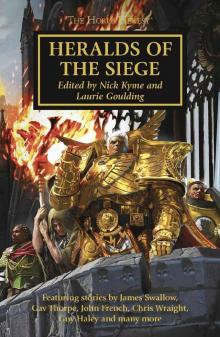 Heralds of the Siege
Heralds of the Siege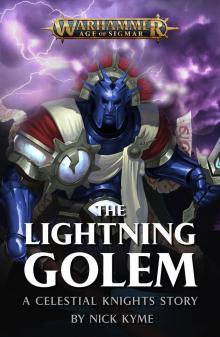 The Lightning Golem
The Lightning Golem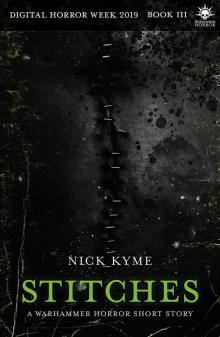 Stitches
Stitches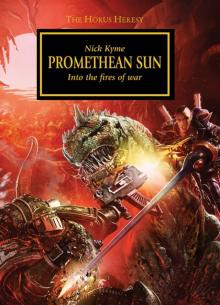 Promethean Sun
Promethean Sun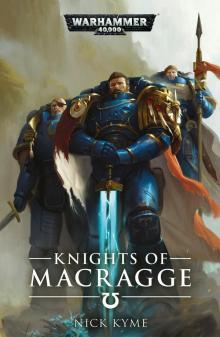 KNIGHTS OF MACRAGGE
KNIGHTS OF MACRAGGE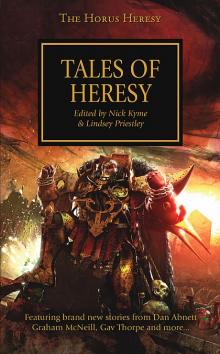 Tales of Heresy
Tales of Heresy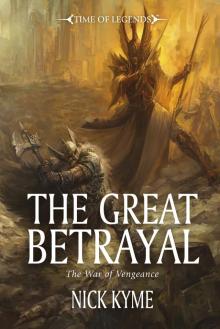 The Great Betrayal
The Great Betrayal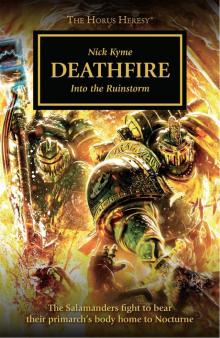 Deathfire
Deathfire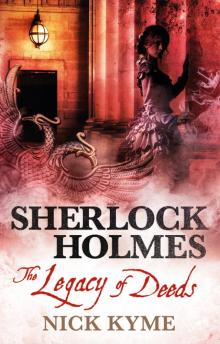 Sherlock Holmes--The Legacy of Deeds
Sherlock Holmes--The Legacy of Deeds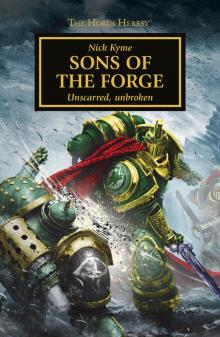 Sons of the Forge
Sons of the Forge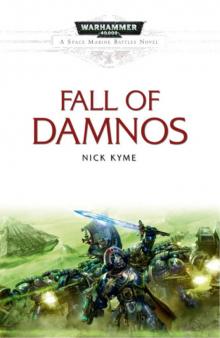 Fall of Damnos
Fall of Damnos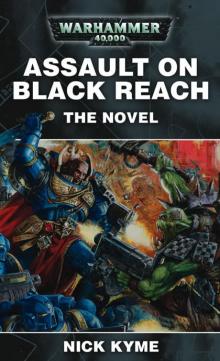 Assault on Black Reach: The Novel
Assault on Black Reach: The Novel![[Horus Heresy 10] - Tales of Heresy Read online](http://i1.bookreadfree.com/i/03/27/horus_heresy_10_-_tales_of_heresy_preview.jpg) [Horus Heresy 10] - Tales of Heresy
[Horus Heresy 10] - Tales of Heresy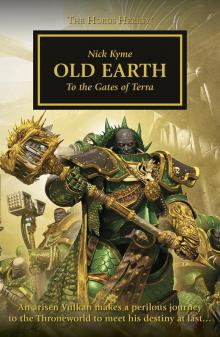 Old Earth
Old Earth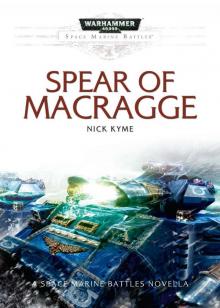 Spear of Macragge
Spear of Macragge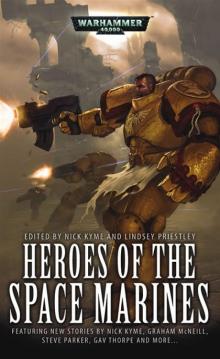 Heroes of the Space Marines
Heroes of the Space Marines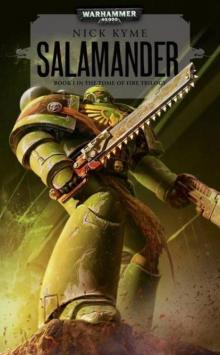 Salamander (warhammer 40000)
Salamander (warhammer 40000)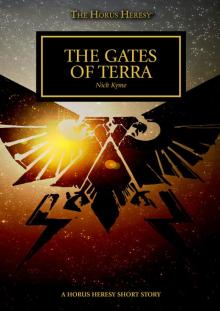 The Gates of Terra
The Gates of Terra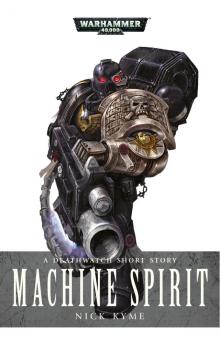 Machine Spirit
Machine Spirit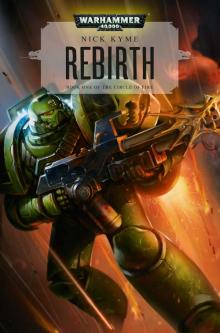 Salamanders: Rebirth
Salamanders: Rebirth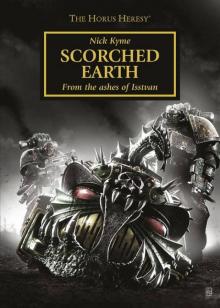 Scorched Earth
Scorched Earth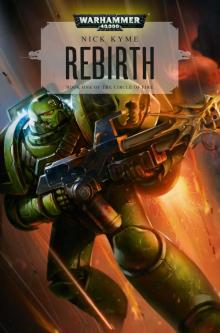 Rebirth
Rebirth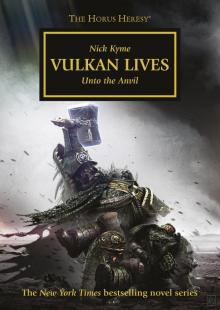 Vulkan Lives
Vulkan Lives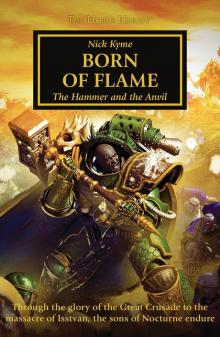 Born of Flame
Born of Flame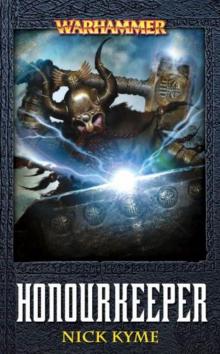 Honourkeeper
Honourkeeper